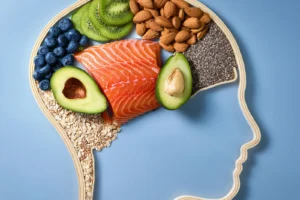Healthy Nutrition for Students During Exams Periods-The Science of Brain-Friendly Nutrition
This topic, titled Healthy Nutrition for Students During Exams, provides an in-depth understanding of how various nutrients influence brain function, cognitive performance, and memory. It covers:
- The Brain’s Energy Needs: How glucose and fats serve as essential fuels for concentration and alertness. (Frontiers in Neuroscience, 2017)
- Macronutrients: The role of carbohydrates, proteins, and healthy fats in brain development and neurotransmitter activity. (Harvard T.H. Chan School of Public Health)
- Micronutrients: The importance of vitamins and minerals like B vitamins, iron, magnesium, zinc, and vitamin D in cognitive processes and stress management. (World Health Organization)
- Hydration: The critical link between water intake and mental clarity, including the effects of even mild dehydration on academic performance. (European Journal of Clinical Nutrition, 2012)
- Scientific Foundations: Supported by research from reputable sources including peer-reviewed journals like PubMed and the National Institutes of Health (NIH).
Smart Dietary Habits for Peak Exam Performance
Focused on real-world strategies, this section translates nutritional science into practical habits students can implement easily, including:

- Daily Eating Patterns: Why breakfast matters, how frequent small meals help stabilize energy, and how to avoid sugar crashes. (Academy of Nutrition and Dietetics)
- Foods to Prioritize: Nutrient-dense options like leafy greens, berries, whole grains, legumes, eggs, and fatty fish. (Cleveland Clinic – Brain Foods)
- What to Avoid: Processed foods, sugary snacks, energy drinks, and excessive caffeine. (CDC – Added Sugars)
- Meal Planning: How to build balanced meals and snacks on a student budget, including sample menus. (MyPlate.gov)
- Quick Recipes: Time-saving ideas for nutrient-rich meals such as smoothies, wraps, and no-cook snacks. (BBC Good Food)
- Meal Timing and Study Schedules: Aligning food intake with optimal brain functioning times. (Harvard Health)
Wellness Beyond Food: A Holistic Approach
Nutrition is one piece of the wellness puzzle. This section explores complementary lifestyle practices and mental health strategies, such as:

- Stress Management: Techniques like mindfulness, breathing exercises, and journaling. (Psychology Today)
- Sleep Hygiene: Why sleep is essential for memory consolidation and how to improve sleep quality. (Sleep Foundation)
- Physical Activity: The cognitive benefits of moderate daily exercise during study periods. (Mayo Clinic)
- Special Dietary Considerations: Addressing the needs of students with allergies, vegan or vegetarian diets, or specific cultural food practices. (Harvard Health – Vegetarian Diet)
- Nutrition Myths Debunked: Clarifying common misconceptions like “sugar boosts brain power” or “skipping meals saves time.” (Healthline – Brain Myths)
- Resource Directory: Curated list of credible websites, books, and scientific papers for further exploration.
Exams challenge both mental and physical endurance. As stress increases, many students abandon healthy eating habits for quick fixes sugary snacks, caffeine, and fast food. Yet science shows that nutrition plays a foundational role in academic performance. This book explores how food affects the brain, how students can build optimal diets, and why this matters more during exams than at any other time.
Read more about how to What Science Says About Eating Protein Before Bed




